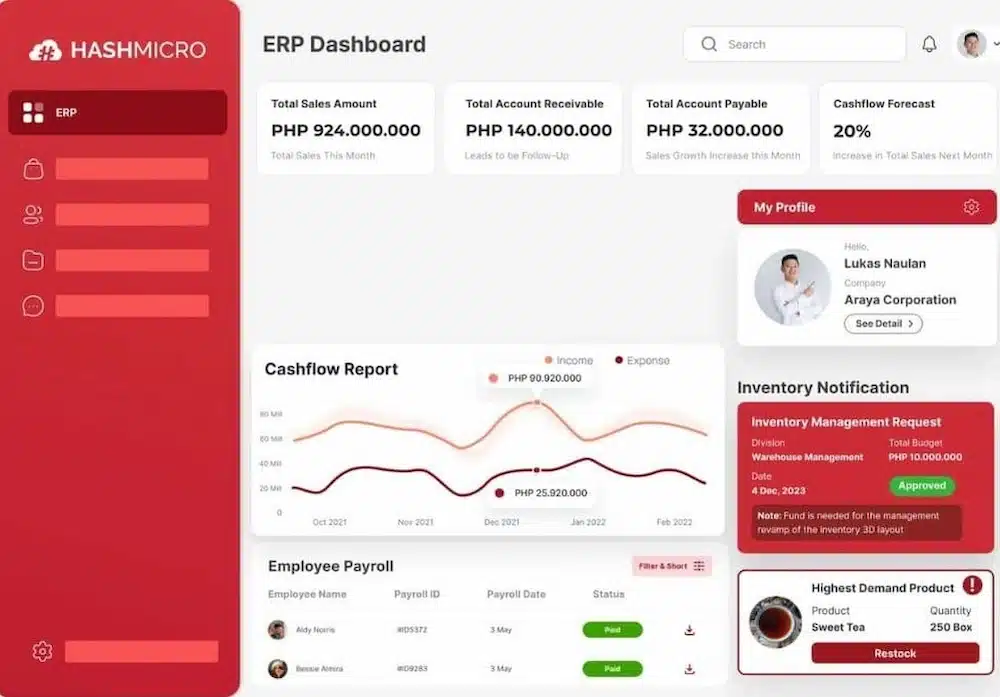Welcome to our article on cloud ERP solutions for Philippine businesses. In today’s digital age, streamlining operations and boosting efficiency are crucial for organizations to stay competitive. That’s where cloud ERP solutions come in.
Cloud ERP solutions offer a range of benefits that can help Philippine businesses modernize their systems and improve business processes. With the increasing demand for digital transformation in the country, it has emerged as a popular choice for organizations looking to streamline operations and gain a competitive edge.
In this article, we will explore the definition and evolution of cloud ERP, compare it with on-premise ERP systems, discuss the advantages specific to Philippine businesses, examine the key components of cloud ERP software, highlight factors to consider when choosing the right cloud ERP solution, address security and compliance concerns, provide steps for successful implementation, and discuss future trends in cloud ERP.
So, if you’re a business in the Philippines looking to streamline your operations and boost efficiency, keep reading to learn more about how it can benefit your organization.
Table of Contents
Introduction to Cloud ERP
Cloud ERP refers to the use of enterprise resource planning (ERP) system that is hosted on servers and accessed over the internet. Unlike traditional ERP systems that are installed on-premise, cloud ERP allows businesses to access their critical applications anytime and from any location.
This shift from on-premise to cloud-based solutions has revolutionized the ERP landscape, providing organizations with greater flexibility, scalability, and accessibility. Cloud ERP has evolved from the early days of on-premise ERP systems to become a cost-effective and efficient solution for managing business processes.
With cloud ERP, businesses no longer need to invest in costly infrastructure or worry about the maintenance and upgrades of hardware and software. Instead, they can rely on cloud service providers to manage the technology infrastructure, ensuring high availability and security for their ERP system.
Cloud ERP offers a wide range of advantages over traditional ERP systems. It provides real-time access to data, enabling better decision-making and improved responsiveness to market changes. With cloud ERP, businesses can easily scale their operations to accommodate growth or seasonal demand without additional hardware or software investments.
The evolution of cloud ERP has also led to the development of industry-specific solutions catering to different sectors’ unique needs. From manufacturing and retail to healthcare and finance, cloud ERP software offers tailored functionalities that optimize business processes and enhance productivity.
In summary, cloud ERP has transformed how businesses manage their operations, offering cost-effectiveness, flexibility, and accessibility. As cloud technology advances, we can expect further innovations and advancements in cloud ERP, bringing even more benefits to organizations in the Philippines and beyond.
Cloud ERP vs. On-premise ERP
When choosing an enterprise resource planning (ERP) solution, it’s important to consider the differences between cloud vs on premise ERP systems. These two deployment models vary in terms of functionalities and accessibility, each with its own set of advantages and considerations.
Cloud ERP solutions, such as Oracle NetSuite and SAP Business ByDesign, offer a wide range of features that can be accessed remotely through the internet. This means that you can access your ERP system anytime and from any location, providing your team with flexibility and mobility.
Cloud ERP provides businesses in the Philippines with scalability, real-time data access, and seamless integration with other cloud-based applications, enabling you to adapt quickly to changing business needs and leverage the power of the cloud.
On the other hand, on-premise ERP systems, like Microsoft Dynamics 365 and SAP ERP, require installing and maintaining software and hardware within your organization’s premises.
While this offers greater control and customization options, on-premise ERP typically requires higher upfront costs and ongoing maintenance. However, it may be the preferred choice for organizations with specific security or compliance requirements.
In summary, cloud ERP provides businesses in the Philippines with the flexibility and scalability they need to thrive in a fast-paced digital world. At the same time, on-premise ERP offers greater control and customization options. The choice between the two depends on your specific requirements, budget, and long-term business goals.
Advantages of Cloud ERP
Cloud ERP solutions offer several advantages that are specifically beneficial for Philippine businesses. By adopting cloud ERP, Philippine businesses can reap the following benefits:
1. Cost savings: Cloud ERP eliminates the need for upfront investments in hardware, infrastructure, and maintenance. This helps Philippine businesses reduce IT infrastructure costs and allocate their resources more efficiently.
2. Improved collaboration and communication: Cloud ERP enables seamless collaboration and communication across different departments and locations. Teams can easily access and share real-time data, enhancing productivity and decision-making.
3. Scalability: Cloud ERP solutions offer flexible scalability, allowing Philippine businesses to adjust their system resources based on their changing needs easily. This ensures that businesses can efficiently manage growth without incurring additional costs.
4. Flexibility: Cloud ERP allows Philippine businesses to access critical business applications anytime and from anywhere using various devices. This allows for remote work, enabling employees to stay productive outside the office.
5. Ease of access: Philippine businesses can access cloud ERP systems through a web browser interface, eliminating the need for complex software installations or specific hardware requirements. This makes it easier for businesses to deploy and manage their ERP solution.
6. Enhanced security: Cloud ERP solutions employ advanced security measures, such as data encryption, access controls, and regular backups. This ensures the safety and confidentiality of Philippine businesses’ sensitive information, mitigating the risk of data breaches.
By leveraging these advantages, Philippine businesses can streamline their operations, reduce costs, and gain a competitive edge in the market. Cloud ERP enables organizations to adapt quickly to changing business needs, leveraging the latest technologies without significant capital investments.
Key Components of Cloud ERP Software
Cloud ERP software comprises key components: accounting, finance, HR management, SCM, CRM, and manufacturing modules. Each module streamlines operations, automate processes, and enhance decision-making.
For accounting and finance, cloud ERP software provides features such as financial reporting, budgeting, and expense management. These functionalities enable businesses to efficiently manage their financial data, track expenses, and generate accurate financial reports.
In terms of human resources management, cloud ERP software includes modules for employee data management, payroll processing, and performance evaluation. These features help organizations streamline HR processes, automate payroll calculations, and effectively evaluate employee performance.
Supply chain management modules in cloud ERP software facilitate inventory management, purchasing, and order fulfillment. These functionalities enable businesses to optimize supply chains, track inventory levels, and streamline procurement processes.
Customer relationship management (CRM) modules in cloud ERP software offer tools for managing customer data, sales processes, and marketing campaigns. These features help businesses enhance customer relationships, track sales opportunities, and analyze customer behavior for targeted marketing efforts.
The manufacturing module in cloud ERP software supports production planning, material management, and quality control. This functionality enables organizations to streamline their manufacturing processes, optimize resource utilization, and maintain product quality standards.
The integration of these key components within a cloud ERP system ensures seamless data flow across different departments of an organization, enabling better coordination and efficiency. Businesses can benefit from improved visibility, enhanced collaboration, and streamlined processes, leading to increased productivity and operational excellence.
Choosing the Right Cloud ERP
Filipino companies face several considerations when selecting the ideal cloud ERP solution for their business. By evaluating these factors carefully, you can choose a cloud ERP system that aligns with your unique business requirements, driving growth and success.
The factors to consider include:
- Cost: Assess the pricing structures and compare them to your budget to ensure affordability and a good return on investment.
- Scalability: Determine if the cloud ERP system can scale alongside your business as it grows, accommodating an expanding user base and increased data storage needs.
- Customization Options: Evaluate the level of customization available, ensuring that the system can be tailored to your specific needs and workflows.
- Industry-Specific Functionalities: Look for cloud ERP solutions that offer industry-specific features and capabilities to address the unique needs of your business sector.
- Integration Capabilities: Consider the compatibility of the cloud ERP system with other essential business applications and software you currently use or plan to implement in the future.
- Vendor Reputation: Research the reputation and track record of potential cloud ERP vendors to ensure reliability, quality, and ongoing support.
- Data Security and Compliance: Verify that the cloud ERP solution provides robust security measures, data encryption, and compliance with relevant regulations to protect sensitive information.
- User-Friendliness: Evaluate the user interface and usability of the cloud ERP system to ensure ease of adoption and minimal training requirements for your staff.
- Customer Support: Investigate the level of customer support offered by the cloud ERP vendor, including their responsiveness and availability when assistance is needed.
Considering these factors will help Filipino companies decide when to select the most appropriate cloud ERP solution for their business needs. If you are curious about which ERP software to choose, you can take a look at our best ERP software recommendations.

Security and Compliance in Cloud ERP
When deploying cloud ERP solutions, security and compliance are crucial for Philippine organizations. Addressing concerns like data breaches, unauthorized access, and compliance with regulations is essential. Cloud ERP vendors have implemented robust security measures to safeguard data.
Cloud ERP providers prioritize data security by employing advanced encryption techniques to protect your information from unauthorized access.
They also implement strict access controls, ensuring that only authorized individuals can access sensitive data. Additionally, regular backups and disaster recovery plans are in place to mitigate the risk of data loss and maintain business continuity.
Compliance with industry regulations is another crucial aspect of cloud ERP. To meet these requirements, reputable cloud ERP vendors ensure that their solutions adhere to relevant data privacy and security standards. By choosing a trusted cloud ERP provider, you can have confidence that your data is being handled in compliance with industry regulations.
For Filipino businesses, selecting a cloud ERP provider that prioritizes both security and compliance is paramount. Doing so can protect your sensitive information, maintain data integrity, and ensure regulatory compliance. These measures will give you peace of mind and allow you to focus on leveraging the advantages of cloud ERP to optimize your business processes.
Implementing Cloud ERP
Implementing cloud ERP requires a strategic approach to ensure a successful transition for Philippine businesses. By following a series of well-defined steps, you can effectively implement a cloud ERP system and maximize its benefits.
Step 1: Assess Business Needs
Before implementing a cloud ERP solution, assessing your business needs and identifying the specific requirements you want the system to fulfill is crucial. This includes considering factors such as the size of your organization, the number of users, budget constraints, and the functionalities you require to streamline your operations.
Step 2: Select the Right Cloud ERP Vendor
Choosing the right cloud ERP vendor is a critical decision that can significantly impact the success of your implementation. Evaluate vendors based on their experience, reputation, customer reviews, and the compatibility of their solutions with your business requirements. Request demos and compare different providers to make an informed decision.
Step 3: Data Migration
During the implementation process, you must migrate your data from existing systems to the new cloud ERP platform. Ensure that you have a well-defined data migration plan in place and consider the assistance of experts if needed. Verify the migrated data’s accuracy and integrity to avoid disruptions to your business operations.
Step 4: System Configuration and Customization
Once your data is migrated, configure your cloud ERP system according to your business processes and workflows. Customize the system to meet your specific requirements by adjusting settings, creating user roles, and defining workflows. This step ensures that the cloud ERP solution aligns perfectly with your organization’s needs.
Step 5: Testing
Thoroughly test your cloud ERP system before going live to identify and resolve any potential issues. Conduct functional, integration, and performance testing to ensure that the system operates smoothly and meets your business requirements. This step helps minimize the risk of errors and ensures a seamless transition from the legacy system to the cloud ERP platform.
Step 6: Training and Change Management
Train your employees on how to use the new cloud ERP system effectively. Offer comprehensive training sessions or workshops to familiarize them with the functionalities and features of the platform. Support your employees through the transition process by providing resources and addressing any concerns or resistance. Encourage their active participation and promote a positive mindset towards the new system.
Step 7: Post-Implementation Support and Optimization
After the cloud ERP system is successfully implemented, provide ongoing support to your employees as they adapt to the new workflow. Address any issues or challenges that arise and continuously optimize the system based on user feedback and evolving business needs. Regularly evaluate the system’s performance and make necessary adjustments to ensure it remains aligned with your organization’s goals.
By following these steps and collaborating closely with your chosen cloud ERP provider, you can navigate the implementation process smoothly and successfully transition to a cloud-based system. This will enable your Philippine business to leverage the full potential of cloud ERP, streamline operations, and drive growth in today’s digital era.
Future Trends in Cloud ERP
The cloud ERP landscape is constantly evolving, with several future trends and innovations shaping the industry. These advancements offer exciting opportunities for businesses in the Philippines to stay ahead of the curve and leverage the latest technology in their cloud ERP solutions.
One future trend to watch is the integration of artificial intelligence (AI) and machine learning (ML) capabilities into cloud ERP systems. AI and ML can help enhance decision-making by analyzing vast amounts of data and providing valuable insights. Automation processes can also be improved, leading to increased efficiency and productivity.
Another innovation on the horizon is the use of blockchain technology in cloud ERP. Blockchain offers secure and transparent transactions, ensuring the integrity and privacy of sensitive data. By leveraging blockchain technology, businesses can have greater confidence in their supply chain management, financial transactions, and data sharing processes.
The adoption of Internet of Things (IoT) devices is also expected to have a profound impact on cloud ERP. IoT devices can collect real-time data and provide valuable insights into various business operations. By integrating IoT devices with cloud ERP systems, businesses can monitor and control processes more effectively, leading to improved decision-making and enhanced efficiency.
Furthermore, industry-specific cloud ERP solutions are being developed to cater to the unique needs of different sectors. These solutions offer specialized functionalities and features tailored to specific industries, enabling businesses to streamline their operations and maximize productivity. By embracing industry-specific cloud ERP, Philippine businesses can optimize their workflows and gain a competitive advantage.
By keeping abreast of these future trends and innovations in cloud ERP, Philippine businesses can position themselves for success in a rapidly changing digital landscape. Try the free demo now!
















































